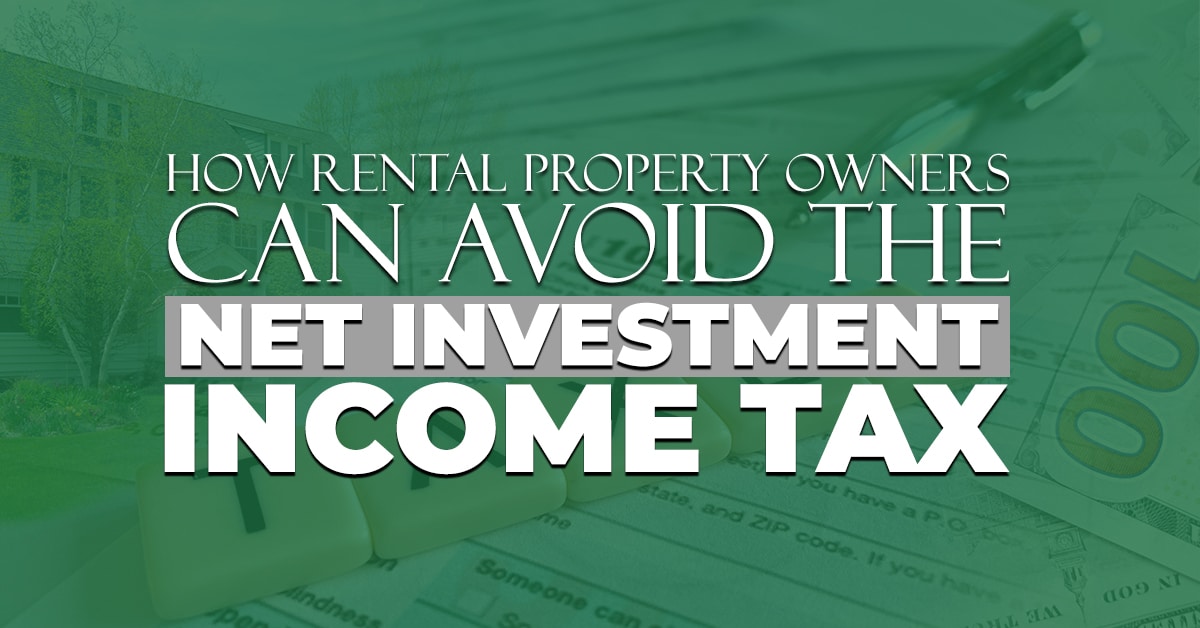How Rental Property Owners Can Avoid the Net Investment Income Tax

Houston area investment property owners have every reason to be concerned about the Net Investment Income Tax (NIIT). It’s an extra 3.8 percent of tax in addition to whatever amounts you are already paying for federal income and self-employment tax.
With rental properties as a primary focus for the NIIT, it can quickly make a good potential investment look downright frightful.
The good news is there are some ways to reduce your rental income tax exposure to it. In fact, you may even qualify to be exempt from it altogether. Let’s dig into it and see how you are affected.
What is the Net Investment Income Tax?
The Net Investment Income Tax has been around since 2013 and is found in the Internal Revenue Code section 1411.
According to the IRS, “the NIIT applies at a rate of 3.8% to certain net investment income of individuals, estates, and trusts that have income above the statutory threshold amounts. ”
As intimidating as that sounds, there are several ways to avoid this tax even if you are above the income “threshold amounts”.
What is Net Investment Income?
Net investment income includes:
- Rental income
- Capital gains from:
- Sale of investment real estate (including the sale of a secondary residence)
- Sale of stocks, mutual funds, and bonds
- Capital gain distributions from mutual funds
- Sale of interests in S corporations and partnerships
- Royalties
- Dividends and Interest
- Income from passive activities businesses and those trading commodities or financial instruments
Net investment income is not:
- Wages, unemployment compensation, Social Security benefits, or alimony
- Self-employment income
- Operating income from a non-passive business (see the Real Estate Professional exemption discussed below)
- Tax-exempt interest payments or distributions from Qualified Plans
How is the modified adjusted gross income for the Net Investment Income Tax calculated?
Simply put, for the purposes of calculating the Net Investment Income Tax, your modified gross income is usually the same as your adjusted gross income from line 37 on Form 1040 minus any above-the-line deductions.
It’s important to note that any income that is excluded from gross income for regular income tax calculation is not subject to the Net Investment Income Tax.
Taxpayers living abroad or those who have income from passive foreign investment companies or controlled foreign corporations may have more adjustments to calculate their modified adjusted gross income. IRS code 1.1411-10(e) can help with those unique situations.
What are the income thresholds?
The income thresholds that trigger the Net Investment Income Tax vary based on your filing status and your modified adjusted gross income as shown here:
● Single $200,000
● Married filing jointly $250,000
● Married filing separately $125,000
● Head of household $200,000
● Qualified widow(er) with a dependent child $250,000
How is the Net Investment Income Tax calculated?
The Net Investment Income Tax is 3.8 percent is of the lesser of
- the amount of modified adjusted gross income exceeds your income threshold, as shown above, or
- your Net Investment Income.
Let’s look at two examples.
Example 1: Mary, a taxpayer filing with as “single” status, has a modified adjusted gross income (MAGI) of $250,000 which includes $100,000 that is Net Investment Income (NII).
Mary’s Net Investment Income Tax (NIIT) will be the lesser of
- her $100,000 NII, or
- the amount her MAGI of $250,000 exceeds the single taxpayer threshold of $200,000, which would be $50,000.
$50,000 is the lesser amount, so, Mary will owe 3.8 percent of $50,000 making her NIIT for the year, $1,900 ($50,000 x 3.8% = $1,900).
Example 2: Tom and Becky, filing status “married filing jointly”, have a MAGI of $450,000 which includes $100,000 of NII.
Tom and Becky’s NIIT will be the lessor of
- their $100,000 NII
- or the amount their MAGI of $450,000 exceeds the married filing jointly threshold of $250,000, which would be $200,000
In this instance, the NII of $100,000 is the lesser amount, so, Tom and Becky will owe 3.8 percent of $100,000 making their NIIT for the year $3,800 ($100,000 x 3.8% = $3,800).
You will use Form 8960 to calculate your Net Investment Income Tax and then report the results on Form 1040.
Exemptions from the Net Investment Income Tax
There are some individuals who are automatically exempt from the Net Investement Income Tax including those with the following status as defined by the IRS:
- Nonresident Aliens (NRAs)
- Dual resident claiming foreign residency for tax purposes
- Dual resident claiming partial year tax residency (exemption only for the partial year Net Investment Income earned while claiming US residency)
Some estates and trusts also may be exempt:
- Charitable trusts and retirement plan trusts (section 501)
- Charitable remainder trusts (section 664)
- Estate or trust with unexpired interests (section 170)
- Grantor trusts (sections 671-679)
- Real estate investment trusts and Common Trust Funds
- Perpetual Care Trusts
- Electing Alaska Native Settlement Trusts
Unfortunately, most real estate investors do not fall under the above exemptions, however, do not give up hope. There are still some income exemption strategies you can use.
Real Estate Professionals NIIT Exemption
The IRS gives a real estate professional the ability
- to deduct their rental losses from non-rental income, and
- to possibly have their income exempt from the Net Investment Income Tax.
This sounds great you say, so sign me up. Well, it’s not quite that easy.
The IRS has a strict definition of who can be viewed as a real estate professional for tax purposes. This exemption strategy also requires material participation in the rental activity as opposed to passive participation.
First, let’s examine the IRS definition of a Real Estate Professional.
To qualify, you must spend (a) more than 750 hours working in real estate business activity and (b) this must be more than fifty percent of your over all working time.
This means if you worked 20 hours a week with your rental properties and other real estate work, any other work would be limited to less than 20 hours a week.
Second, you must show you are materially participating in the rental business and not just passively involved. The most common ways are (1) doing all the work yourself, or (2) spending over 100 hours of work on the property yourself given that’s more than anyone else.
The IRS does allow you to group rentals together to combine work time in order to pass the material participation criteria.
The last part of this exemption strategy is to show the rental activity as a business and not an investment. To do this, the real estate professional. The safe harbor rule provided is to show at least 500 hours a year devoted to the rental activity.
As a safe harbor rule, this is guidance and not a requirement, so be prepared to establish your material participation with clear record-keeping as this will protect your rental activity qualifying as a business.
Short-Term Rental NIIT Exemption
Short-term rentals are generally viewed as a business and not an investment provided you materially participate in the rental activity. This applies whether you use a Schedule C or Schedule E to report the business.
Again, good record keeping including your time spent coupled with a solid understanding of the IRS rules regarding rental property businesses will ensure you can use this NIIT exemption.
Real Estate Tax Services
The Net Investment Income Tax is just one factor you need to consider when planning your real estate tax strategy. To be honest, when it comes to rental income tax advice, there’s no shortage. But that does not mean it’s the right advice for your real estate goals.
As a Houston accountant with years of experience helping real estate professionals and investors, I can help you craft the right tax strategy that will find every rental income tax deduction possible and preserve as much of your profit as possible.
Schedule a no-obligation consultation with us today and let us prove our worth as the leading accounting services for small businesses in Houston.






